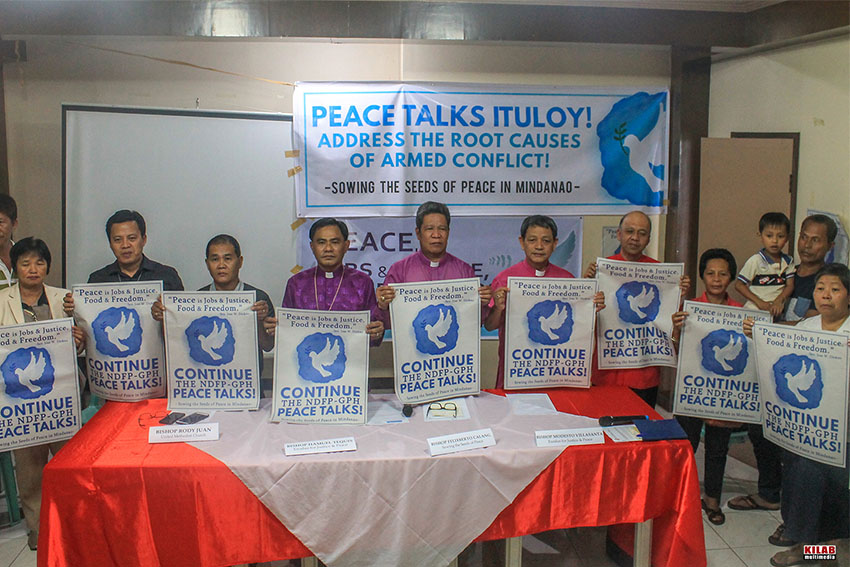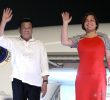
Bishops from various religious denominations n Mindanao called on President Rodrigo Duterte to continue the peace negotiations with the National Democratic Front of the Philippines. (Photo by Kilab Multimedia)
DAVAO CITY, Philippines – Bishops from various religious denominations n Mindanao called on President Rodrigo Duterte to continue the peace negotiations with the National Democratic Front of the Philippines.
The call from the prelates came as peace advocates have drummed up separate call for the President to resume the peace negotiations.
“We now have a president from Mindanao and we are calling on him to bring peace for the Mindanaoans,” said Bishop Felixberto Calang of the Iglesia Filipina Independiente and lead convenor of the Sowing the Seeds of Peace in a press conference Friday, Feb. 24.
The Sowing the Seeds, movement for just and lasting peace in Mindanao, also announced that they will hold peace rallies in 16 cities in Mindanao that aims to gather 30,000 Mindanaoans on February 27.
Calang said there are “compelling reasons” for the President to continue the talks.
“We have here the families of the NPAs ‘prisoners of war’, we also have the victims of the all out war and the victims of the civilians who were killed, These are compelling reasons so to speak,” Calang said.
Bishop Hamuel Tequis of the United Church of Christ of the Philippines said Duterte was voted by the majority as President as he has the distinction of being a “Left and socialist candidate.”
“This is a recognition that our country has been mired in deep social crises that have engendered unpeace and armed revolutions resulting from decades old structural inequalities and injustice,” Tequis said.
Most substantive
Tequis said the peace talks that have gone through several years of impasse is the “most substantive in a relatively short span of time” under the Duterte administration.
“Compared to six years of the Aquino presidency and the eight years of the Arroyo governemnet where the period devoted to the talks could be less compressed to less than six months altogether of the Duterte administration,” he said.
Among those signed in the recent peace talks between the government and the NDFP were the ground rules for the conduct of meeting of the reciprocal working committees on social and economic reforms. The rules included the forming of bilateral teams that would speed up the negotiations on social and economic reforms which is the “heart and soul” of the peace negotiations.
According to the Joint Statement signed by the peace panels, “the parties have agreed in principle to the free distribution of land to farmers and farm workers as part of the governing frameworks of CASER.”
The Parties have also exchanged their drafts and initially discussed the third substantive agenda which is the Political and Constitutional Reforms.
They have also discussed the proposal for a federal form of government. The government and the NDFP also signed last month the Supplementary Agreement for the full operationalization of the Joint Monitoring Committee for the implementation of the Comprehensive Agreement on Respect for Human Rights and International Humanitarian Law.
The panels were set to discuss the proposal for a bilateral ceasefire and other issues on the compliance of the previously signed agreements on February 22 to 25 in The Netherlands.
‘Knee-jerk’ response
Duterte ordered the suspension of the peace negotiations on February 4, a day following his order of the effective lifting of the government’s unilateral ceasefire. Duterte cited the armed encounter between government troops and the New People’s Army in Bukidnon on February 2 where three soldiers were killed.
Prior to this, the Communist Party of the Philippines and the NPA announced the lifting of their unilateral ceasefire on February 1. The lifting only turned effective on February 10.
However, reading the Pastoral Statement of the United Methodist Church, Bishop Rodolfo Juan, resident bishop of the Davao Episcopal Area said the President gave a “knee-jerk” response in terminating the government’s ceasefire.
“Instead of immediately calling for an investigation, the president’s knee-jerk reflex jolted him into terminating an on-going and seemingly succeeding peace-talks, exposing his concern primarily for the welfare of men in uniform over against the plight of the majority of the filipino people who are currently suffering injustice and penury,” the UMC said in a statement.
The College of Bishops and The Philippines Central Conference Board of Church and Society of the UMC also appealed to the President to “change his mind about terminating the peace talks with the National Democratic Front of the Philippines (NDFP), pave the way for the resumption of discussions, return to the negotiating table, and pursue with the NDFP the next rounds of talks.”
They also called on the “peace-wreckers” not to deprive the community of the peace and justice they want.
“Please desist now from your violence. Stop killing the poor. You are not pursuing the interest of the poor nor of the public, but the interest of the few in the ruling class,” the UMC said.(davaotoday.com)










